经典句型总汇
英语经典句型300例(重点句型)

英语经典句型300例(重点句型)1.According to 依照/根据…… 2.Am I allowed to 我可以……吗3.As matter of fact 实际上…… 4.As far as I'm concerned 就我而言5.As far as I know 据我所知6.As I just mentioned 正如我刚才提到过的7.As I see it 在我看来8.As is known to us all 众所周知,…… 9.As long as 只要… 10.But for... 若不是因为;如果没有…… 11.Can you believe (that) 你相信……吗12.Can you imagine 你能想像……吗13.Could you please explain 你能解释一下……吗14.Can't we... 难道我们不能……吗15.Could you do me a favor and... 能否请你帮我一个忙… 16.Do you by any chance know... 你(碰巧)知道……吗17.Do you enjoy doing... 你喜欢做……吗18.Do you happen to know... 你(碰巧)知道……吗19.Do you have any good ways to... 你有没有……的好办法20.Did you know (that)... 你知道……吗21.Do you know if (whether)... 你知道是否…… 22.Do (Would) you mind doing... 你介意做……吗23.Do (Would) you mind if... 如果……你是否介意24.Do you realize (that)... 你有没有意识到…… 25.Do you think it is possible to... 你认为……可能吗26.Do you think it necessary to... 你认为有必要……吗27.doesn't make sense 没有道理/没有意义/不清楚28.Don't be afraid of...不要害怕…… 29.Don't take it for granted that...别认为……理所当然30.Don't waste time doing...不要浪费时间做…… 31.Don't you think that...难道你不认为……吗32.Excuse me for...请原谅我…… 33.For one thing For another一方面……;另一方面…….34.From my point of view在我看来,…… 35.From where I stand从我的立场来说…… 36.Generally speaking总的来说…… 37.Hardly when...一……就……. [倒装句型]38.Have you considered doing...你有没有考虑过做…… 39.Have you decided...你决定好……了吗40.Have you ever been to...你曾经去过……吗41.Have you thought about(of) ...你有没有想过…… 42.Haven't you heard of ...难道你没听说过……吗43.How are you getting on (along) with... ……进展如何/与……相处如何44.How are you going to...你打算如何…… 45.How does sound(听起来)怎么样46.How long will it take you to...要用多长时间47.How should I...我该如何…… 48.I absolutely agree with我完全同意… 49.I absolutely agree with我完全同意… 50.I'm grateful for...我对……特别感激51.I am planning to我打算…… 52.I am very pleased to have this opportunity to...我很高兴有机会… 53.I apologize for...我为……道歉54.I believe (that)我相信…… 55.I believe we should...我认为我们应该…… 56.I can't imagine...我无法想像… 57.I can't stand it when...我无法忍受…… 58.I didn't expect to...我没想到…… 59.I didn't mean to...我不是有意…… 60.I didn't realize...我不知道…….俄没意识到…… 61.I (don't) feel like...我(不)想…… 62.I don't get very excited about...我对……不怎么感兴趣.63.I don't know how to...我不知道如何…… 64.I don't see (that)...我看不出/我认为不…….65.I don't think it is necessary to...我认为没有必要…… 66.I don't think it's right to...我认为……是不对的.67.I doubt that if (whether)...我怀疑/我不相信…… 68.I dream of...我梦想…… 69.I'm dying to...我渴望…….俄盼望…… 70.I feel very honored to...我觉得很荣幸…… 71.I'm fed up with...我厌倦了…….我受够了…… 72.I'm sick and tired of...我对……感到厌烦.73.I find it hard for me to...我发现……对我来说很难74.I hate to disagree with you, but...我不想跟你有不同意见,但是…… 75.I have confidence in...我相信…….我对……有信心.76.I have nothing to do with...我与……无关.77.I have no experience in...我在……方面没有经验78.I haven't (done)... for a long time我很久没有……了79.I insist that...我坚决要求…… 80.I insist on (doing)我坚持…… 81.I intend to我打算…… 82.I like nothing better than...我喜欢……胜过任何东西83.I never dreamed of我从未想过…… 84.I prefer... to我喜欢……甚于… 85.I prefer to... rather than...我宁愿…...而不愿86.I really want to know...我真的很想知道…… 87.I set my mind to do sth (on sth)我下定决心…….88.I sincerely hope that...我真诚地希望…… 89.I strongly advise you to...我强烈建议你…… 90.I suggest (that)...我建议…… 91.I think this is a good chance for you to...我认为这是你...的一个好机会92.I think it is a good idea to...我认为……是个好主意93.I think it is a waste of money (time) doing...我觉得……是浪费金钱/时间.94.I think it's wrong to...我认为……是不对的.95.I think that it is impossible to...我觉得……是不可能的.96.I think you might like to...我想你可能会喜,灯想…… 97.I think you'd better...我觉得你最好…… 98.I want to express my gratitude to...我要感谢…… 99.I was impressed by...我被……打动了;……给我留下深刻印象.100.I (wonder) was wondering if...我想知道…/我在想是否… 101.I demanded (that)...我要求…… 102.I won't...unless除非……否则我不会… 103.I used to...我过去常常…… 104.I would advise you to...我会建议你…… 105.I would appreciate it if...如果……,我会非常感激.106.I would like to recommend...我想推荐…… 107.I would like to... rather than...我宁愿……也不…… 108.I would rather...than...我宁愿……,而不愿…… 109.I wouldn't feel happy if...如果……我会不高兴的110.I'd be happy to if you'd like如果你愿意,我很高兴… 111.I'd like to know more about...我想了解更多关于… 112.I'd like to suggest you do...我想建议你… 113.I'd like (love) to, but...我很想,但…… 114.I'm (not) certain...我(不)确定…… 115.I'm afraid I won't be able to...恐怕我不能… 116.I'm busy with (doing)...我正忙于…… 117.I'm considering (doing)...我正考虑… 118.I'm convinced that...我确信… 119.I'm curious to (do) about...我对(做)……很好奇120.I'm determined to...我决定… 121.I'm getting a little concerned about...我对……有点担忧. 122.I'm interested in...我对……感兴趣123.I'm (just) calling to...我打电话来是要… 124.I'm (not) sure...我(不是)很确定… 125.I'm not very interested in...我对……不是很感兴趣126.I'm occupied (with)...我忙于… 127.I'm really fond of...我的确喜欢… 128.I'm really (terribly) sorry for...我对……感到非常抱歉129.I've been thinking about...我一直想… 130.I have a desire to...我非常渴望… 131.I've decided to...我已经决定… 132.If I did..., I would...如果我……,我会… 133.If I had done..., I would have done...如果我……,我就会… 134.If I were you... I would...如果我是你……,我就会… 135.If only...!真希望……!若是……那该多好啊!136.If it is possible可能的话… 137.If you ask me, I think...如果你问我,我认为… 138.If you want to...you'll have to...如果你想……,你将不得不… 139.In a word...总之,… 140.In brief (short) ...简言之,…… 141.In conclusion, ...最后,…….聪之,…… 142.In general—般而言,…… 143.In my opinion (view)我认为…… 144.In order to you should...为了…·你应该145.In other words换句话说…… 146.In that case既然那样147....is of great importance...很重要148.Is it convenient for you to...你是否方便… 149.Is it OK if…如果……可以吗150.Is it possible to...有可能吗151.Is there a better way to有没有更好的方法152.Is there any chance you could possibly你有没有可能153.Is there anything else that还有别的吗154.It appears that看来,/ 似乎155.It depends on whether这取决于……是否156.It doesn't make sense to没有任何意义157.It doesn't matter whether (if)如果……也没关系.158.It goes without saying that理应如此/不言而喻.159.It makes a (no) difference (to sb.)(对某人来说)……很重要/无所谓160.It occurred to me that浮现于我的脑中.我想起161.It won't do any harm to没有坏处162.It would be wonderful if要是……那就太好了163.It happened that很偶然164.It helps if如果……的话,将会(对某人)有帮助/好处165.It's amazing (that)很了不起166.It is bad to是不好的167.It's hard to imagine很难想像168.It is believed that人们认为… 169.It didn't (won't) take long before...没多久/不需要多久……就170.It is easier to... than to比.....容易171.It is easy enough to相当容易172.It is essential that...有必要… 173.It is good manners to do是有礼貌的表现.174.It is high time ...现在是……的时候了;早就应该……了175.It is hoped that...希望176.It is important that是很重要的177.It's long been my dream to一直是我的梦想178.It is (very /not) likely that...(很/没)有可能179.It is (not) necessary to是(没)有必要的180.It is no use doing sth.做某事是毫无用处的181.It is not unusual for sb to do...某人做……不足为奇182.It is possible (impossible) to是(不)可能的183.It is dangerous to危险184.It is (rather) common to do...(相当)普遍185.It is reported that...据说;据报导186.lt is required that要求… 187.It is said that据说… 188.It is thought that...人们认为… 189.It is (not) true that(不)是真的.190.It is (very) difficult to(非常)困难.191.Ifs really a challenge for me to对我来说确实是一个挑战192.It is (very) useful to很有用193.It is (was) obvious (clear) that...很明显… 194.It seems (seemed) that...好像…….似乎… 195.It sounds like听起来好像… 196.It takes sb some time (money) to do sth.某人花多长时间/多少钱做某事197.It wasn't until that...直到……才198.It would be wonderful if...如果……那就太好了199.It's not (just) like sb to do sth...的行为不/正像某人的一贯作风200.lt's a bad habit to是一个坏习惯201.It's a great pleasure to(感到)非常愉快202.It's customary to...是习惯203.It's delightful to令人很高兴204.lt's my great honor to是我莫大的荣幸205.It's (not) good to...(不)好206.It's our duty to...……是我们的责任207.It's wrong to…是不对的208.It's a shame (pity) that...可惜/遗憾…… 209.It is (really) unbelievable that……(真)让人难以置信210.It is (will be) difficult to……(会)很难211.It'll do yo u good to……对你有好处st but not least最后但同样重要的是…… 213.Let me explain why让我解释为什么…… 214.Let me fill you in on...让我来告诉你…… 215.(Just) let me know if...如果……,请告诉我216.Let me see if...让我看看是否…… 217.Make sure to do sth—定要做某事218.Maybe it's better to...可能……会更好一些219.means a great deal to me对我意义重大220.My dream (goal) (plan) is...我的梦想/目标/希望所划是… 221.My point of view is that...我的观点是…… 222.no matter what...无论什么… 223.no one can deny that...没有人能够否认… 224.no sooner...than...一……就…… 225.no words can express...语言难以表达……;……难以言表226.Not until...did...直到……才…… 227.Now that既然/由于……228.On the condition that条件是… 229.On the contrary正好相反230.On (the) one hand on the other (hand)一方面……,另一方面… 231.One of the is最……之一的就是…… 232.Personally, I think ( believe) (feel)...我个人认为/相信/感觉… 233.Please don't hesitate to...请随时234.Please feel free to请随时235.Please forgive me for请原谅我236.Please give my best wishes to...请代我问候237.Recent studies show that...最近研究表明… 238.Sb. can do nothing but do...除了做……,某人什么也做不了239.Sb. have no choice but to do...某人除了做……别无选择240.Sb. look(s) as if...某人看上去好像241.Something must be done to必须采取措施242.Sorry to bother you, but很抱歉打扰你,可是243.Thanks to...由于…/多亏244.The point is...重点/关键是245.The problem is that问题是… 246.The reason why... is…的原因就是… 247.The secret of...is to......的秘诀是...248.The way I see it我的看法是… 249.This was the moment when…就是那个时候… 250.That reminds me那提醒了我……;那让我想起了251.There are signs that...有……的迹象/征兆.有迹象表明/显示… 252.There is no doubt that...毫无疑问253.There seems to be...看起来好像254.There used to be...过去曾有……;曾经有过255.There's no point in...是无意义的256.There's no way...绝不可能257.To a great/some extent在很大/某种程度上258.To be frank / honest老实说,…….说实话259.To one's delight让某人高兴/惊奇的是260.To start with首先261.To sum up...总之,…….总而言之262.To tell (you) the truth说实话263.We hold the opinion that...我们认为264.We must do something to...我们必须采取行动以265.We must take action (measures) to...我们必须采取行动/措施以266.We should make every effort to...我们应该竭尽全力267.What do you find the hardest in...你觉得……最大的困难是什么268.What do you mean by...你……是什么意思269.What do you say...你认为……怎么样270.What do you think of...你认为……怎么样271.What I'm getting at is...我的意思是272.What is more serious is that...更严重的是273.What's the point of...意义何在为什么要274.What makes you think...是什么让你认为…;你为什么认为275.What seems to be the problem with...大概是什么问题276.What seems to be the trouble is...好像问题在于277.What surprised me is that...令我吃惊的是278.What will you do if...如果……,你会做什么279.What you have to do is...你必须做的是280.What would you say /think of...你认为……怎么样281.When do you want me to...你想让我在什么时候282.When it comes to...谈到…;涉及到283.When will it be convenient for you to...你看什么时候方便284.Would you be so kind as to...能否请你… 285.Would you like to...你想……吗286.You are expected to...你要;应该287.You are (not) allowed to...(不)允许你288.You are (not) permitted to...(不)允许你289.You are required to要求你290.You are supposed to...你应该291.You don't have to你没必要292.You don't need to你没必要293.You really have to do something about...你的确应该处理一下;你真得为…做点什么了294.You should avoid doing sth.你应该避免做某事295.You should make an effort to...你应该努力296.You should make good use of...你应该充分利用297.You should never...你绝不应该298.You were (not) supposed to...你本(不)应该299.You will be able to... if...如果……,你将能够300.You'll never guess...你永远猜不到。
35个经典英语句型

ããåãAdj + as + Subject(主è¯)+ be, S + V~~~ (è½ç ¶......)
ãã ä¾ å ¥ï¼Rich as our country is, the qualities of our living are by no means satisfactory. {by no means = in no way = on no accountä¸ ç ¹ä¹ ä¸}
ããåå «ãbe + forced/compelled/obliged + to + V (ä¸ å¾ ä¸......)
ãã ä¾ å ¥ï¼Since the examination is around the corner, I am compelled to give up doing sports.
ãã å¼ è å¸ æ¯ææ ¾ç» é å °æ ä» æ ç æ å¸ ã
ããäºãNothing is + ~~~ er than to + V
ããNothing is + more +形容è¯+ than to + V
ãã ä¾ å ¥ï¼Nothing is more important than to receive education.
ãã ä¾ å ¥ï¼It pays to help others.
ãã å¸®å ©å «äººæ ¯å ¼å¾ ç ã
ããäºå å ãbe based on (以......ä¸ºå ºç¡)
英语最常用的60个句型及例句
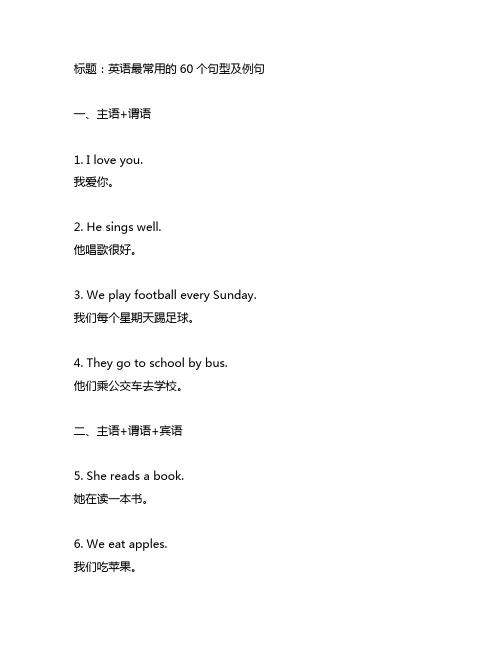
标题:英语最常用的60个句型及例句一、主语+谓语1. I love you.我爱你。
2. He sings well.他唱歌很好。
3. We play football every Sunday. 我们每个星期天踢足球。
4. They go to school by bus.他们乘公交车去学校。
二、主语+谓语+宾语5. She reads a book.她在读一本书。
6. We eat apples.我们吃苹果。
7. He speaks English.他讲英语。
8. They watch TV.他们看电视。
三、主语+谓语+宾语+宾语补足语9. She paints the wall red.她把墙刷成了红色。
10. We call him a hero.我们称他为英雄。
11. He considers the plan unfeasible. 他认为这个计划不可行。
12. They make their father proud.他们让父亲感到自豪。
四、主语+系动词+表语13. I am a teacher.我是一名老师。
14. She was happy.她很快乐。
15. He is my friend.他是我的朋友。
16. They are students.他们是学生。
五、主语+谓语+间宾+直宾17. She teaches us English. 她教我们英语。
18. He bought her a gift. 他给她买了一份礼物。
19. We tell him a story.我们给他讲故事。
20. They show us the way.他们给我们指路。
六、主语+谓语+宾补+宾语21. She made her sister cry.她让她妹妹哭了。
22. They found the problem solved. 他们发现问题已经解决了。
23. He heard the news spread.他听说了消息已经传开了。
英语万能句型大全
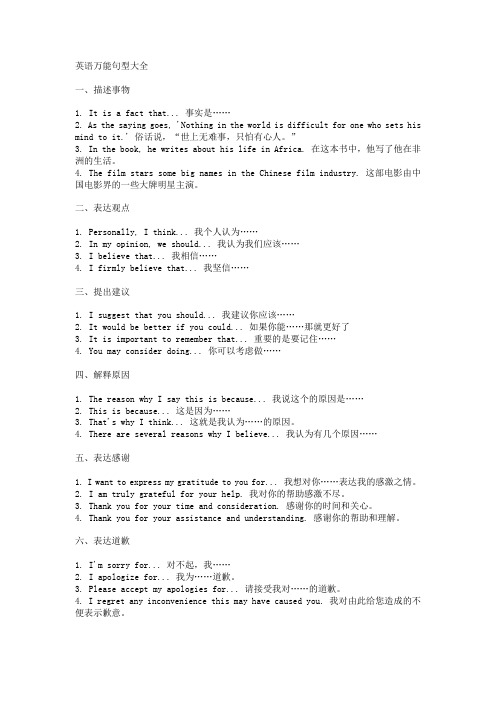
英语万能句型大全一、描述事物1. It is a fact that... 事实是……2. As the saying goes, 'Nothing in the world is difficult for one who sets his mind to it.' 俗话说,“世上无难事,只怕有心人。
”3. In the book, he writes about his life in Africa. 在这本书中,他写了他在非洲的生活。
4. The film stars some big names in the Chinese film industry. 这部电影由中国电影界的一些大牌明星主演。
二、表达观点1. Personally, I think... 我个人认为……2. In my opinion, we should... 我认为我们应该……3. I believe that... 我相信……4. I firmly believe that... 我坚信……三、提出建议1. I suggest that you should... 我建议你应该……2. It would be better if you could... 如果你能……那就更好了3. It is important to remember that... 重要的是要记住……4. You may consider doing... 你可以考虑做……四、解释原因1. The reason why I say this is because... 我说这个的原因是……2. This is because... 这是因为……3. That's why I think... 这就是我认为……的原因。
4. There are several reasons why I believe... 我认为有几个原因……五、表达感谢1. I want to express my gratitude to you for... 我想对你……表达我的感激之情。
英语八大句型例句

英语八大句型例句
1. 主+谓:I run every morning.(我每天早上跑步呀。
)
2. 主+谓+宾:You like reading books.(你不是喜欢读书嘛。
)
3. 主+谓+间宾+直宾:He gave me a hug.(他给了我一个大大的拥抱呢。
)
4. 主+谓+宾+宾补:They made the room clean.(他们把房间弄得干干净净的呀。
)
5. 主+系+表:She is very happy.(她可开心啦。
)
6. There be 句型:There are many flowers in the garden.(花园里有好多花儿呀。
)
7. 祈使句:Come here!(快过来呀!)
8. 感叹句:How beautiful the scenery is!(这景色真美啊!)
9. 疑问句:Do you know him?(你认识他不?)
10. 强调句:It is you who made the mistake.(就是你犯的错呀。
)
我的观点结论就是:这些例句是不是很简单易懂呀,大家可以多练习,英语八大句型就能轻松掌握啦!。
100句英语常用句型

100句英语常用句型一、表达观点1.In my opinion,...(在我看来……)2.I think...(我认为……)3.As far as I'm concerned,...(就我而言……)4.It seems to me that...(在我看来……)5.I believe...(我相信……)6.From my perspective,...(从我的角度来看……)7.Personally, I feel that...(就个人而言,我觉得……)二、询问意见8.What's your opinion?(你有什么看法?)9.How do you think about it?(你觉得怎么样?)10.What's your view on this matter?(你对这件事有什么看法?)11.Do you have any thoughts on...?(你对……有什么想法吗?)12.Could you give me your opinion on...?(你能给我你对……的意见吗?)三、同意与不同意13.I agree with you.(我同意你的观点。
)14.I couldn't agree more.(我完全同意。
)15.That's exactly what I think.(那正是我所想的。
)16.I'm of the same opinion.(我有同样的看法。
)17.On the contrary, I don't think so.(相反,我不这么认为。
)18.I disagree with you.(我不同意你的观点。
)19.I'm afraid I can't agree.(恐怕我不能同意。
)20.That's not how I see it.(我不是这么看的。
)四、请求帮助21.Could you help me?(你能帮我吗?)22.Would you please do me a favor?(你能帮我个忙吗?)23.Can you give me a hand?(你能帮我一下吗?)24.I need your help.(我需要你的帮助。
84个英语基本句型

英语是一门广泛使用的语言,掌握基本句型可以帮助我们有效地表达自己的意思。
下面将介绍84个常用的英语基本句型,希望对大家学习英语有所帮助。
1. 主语 + 动词:I eat.2. 主语 + 动词 + 宾语:She reads books.3. 主语 + 不及物动词:They swim.4. 主语 + 系动词 + 表语:He is happy.5. 主语 + 动词 + 间接宾语 + 直接宾语:She gave me a gift.6. 主语 + 动词 + 宾语 + 宾语补足语:We consider him our friend.7. 主语 + 动词 + 间接宾语 + 直接宾语 + 宾语补足语:They made him their leader.8. 主语 + 动词 + 宾语 + 宾语补足语:He painted the wall red.9. 主语 + 动词 + 宾语 + 间接宾语:She told me a joke.10. 主语 + 不及物动词 + 表语:He became a doctor.11. 主语 + 不及物动词 + 宾语补足语:They elected him president.12. 主语 + 不及物动词 + 宾语 + 宾语补足语:She made him her assistant.13. 主语 + 系动词 + 宾语 + 宾语补足语:I find English interesting.14. 主语 + 系动词 + 表语 + 宾语:She called me a fool.15. 主语 + 系动词 + 宾语 + 宾语补足语:He made me his secretary.16. 主语 + 系动词 + 宾语 + 表语:They named the baby Adam.17. 主语 + 状语 + 动词:We ran quickly.18. 主语 + 状语 + 系动词 + 表语:He felt really tired.19. 主语 + 动词 + 状语:She sings beautifully.20. 主语 + 宾语 + 状语 + 动词:He won the game with great effort.21. 主语 + 宾语 + 状语 + 动词 + 宾语补足语:They elected her president with unanimous support.22. 主语 + 谓语 + 宾语 + 状语:We found the key under the bed.23. 主语 + 谓语 + 宾语 + 状语 + 宾语补足语:She named her daughter Lily out of love for flowers.24. 主语 + 谓语 + 不定式:They want to play.25. 主语 + 谓语 + 动词 + 不定式:He can swim.26. 主语 + 谓语 + 宾语 + 动词 + 不定式:She asked me to help.27. 主语 + 谓语 + 不定式 + 宾语补足语:We believe him to be honest.28. 主语 + 谓语 + 宾语 + 不定式 + 宾语补足语:He wants me to be his assistant.29. 主语 + 谓语 + 不定式 + 状语:You need to study hard.30. 主语 + 谓语 + 动名词:She enjoys swimming.31. 主语 + 谓语 + 宾语 + 动名词:They appreciate her singing.32. 主语 + 谓语 + 动名词 + 宾语补足语:I consider cooking an art.33. 主语 + 谓语 + 不定式 + 动名词:He started to learn painting.34. 主语 + 谓语 + 宾语 + 不定式 + 动名词:She saw him come in.35. 主语 + 谓语 + 宾语 + 不定式 + 状语:We made them stay longer.36. 主语 + 谓语 + 不定式 + 宾语补足语 + 动名词:He wants us to help him finish the project.37. 主语 + 谓语 + 不定式 + 宾语补足语 + 状语:I expect you to arrive on time.38. 主语 + 谓语 + 不定式 + 动名词 + 状语:They will try to solve the problem by working together.39. 主语 + 谓语 + 宾语 + 不定式 + 宾语补足语 + 状语:She persuaded him to stay after school for extra practice.40. 主语 + 谓语 + 分词:He looked tired.41. 主语 + 谓语 + 宾语 + 分词:They found the book interesting.42. 主语 + 谓语 + 分词 + 宾语补足语:We consider him qualified for the job.43. 主语 + 谓语 + 不定式 + 分词:She decided to leave quickly.44. 主语 + 谓语 + 宾语 + 不定式 + 分词:He heard her sing beautifully.45. 主语 + 谓语 + 分词 + 状语:They sat there, waiting for the bus.46. 主语 + 谓语 + 宾语 + 分词 + 状语:We saw her boarding the train.47. 主语 + 谓语 + 分词 + 宾语补足语 + 状语:He walked away, satisfied with his achievement.48. 主语 + 谓语 + 分词 + 不定式:She came running to me to ask a question.49. 主语 + 谓语 + 宾语 + 分词 + 不定式:They saw him standing alone in the rain.50. 主语 + 谓语 + 分词 + 宾语 + 不定式:We watched the movie, hoping to be entertained.51. 主语 + 谓语 + 不定式 + 分词 + 宾语补足语:He wants us to stay focused on our goals.52. 主语 + 谓语 + 不定式 + 分词 + 状语:She needs to finish her homework before going out.53. 主语 + 谓语 + 宾语 + 不定式 + 分词 + 状语:They made him work extra hours to meet the deadline.54. 主语 + 谓语 + 不定式 + 分词 + 宾语补足语:We believe you to have the ability to succeed.55. 主语 + 谓语 + 不定式 + 分词 + 宾语补足语 + 状语:He considered it a great honor to be chosen as the team captain.56. 主语 + 谓语 + 分词 + 状语 + 宾语:They finished the task, exhausted.57. 主语 + 谓语 + 宾语 + 分词 + 状语 + 宾语补足语:She found him standing there, helpless.58. 主语 + 谓语 + 分词 + 宾语 + 状语:He left the room, closing the door behind him.59. 主语 + 谓语 + 分词 + 宾语 + 宾语补足语:We saw her painting the wall red.60. 主语 + 谓语 + 宾语 + 分词 + 宾语补足语 + 状语:They heard him singing in the shower, beautifully.61. 主语 + 谓语 + 分词 + 不定式 + 状语:She stood there, not knowing what to say.62. 主语 + 谓语 + 宾语 + 分词 + 不定式 + 状语:He caught her reading his diary, secretly.63. 主语 + 谓语 + 分词 + 宾语 + 不定式 + 状语:They watched the kids playing happily in the park.64. 主语 + 谓语 + 不定式 + 分词 + 状语 + 宾语补足语:We want you to come prepared for the meeting.65. 主语 + 谓语 + 不定式 + 分词 + 宾语 + 状语:She asked me to stay quiet, not attracting attention.66. 主语 + 谓语 + 分词 + 状语 + 宾语 + 宾语补足语:They arrived at the party late, all dressed up.67. 主语 + 谓语 + 分词 + 宾语 + 状语 + 宾语补足语:I left the office, feeling satisfied with my performance.68. 主语 + 谓语 + 分词 + 宾语 + 宾语补足语 + 状语:He walked away, looking disappointed.69. 主语 + 谓语 + 不定式 + 宾语 + 分词:She wants us to keep the door closed, protecting the animals inside.70. 主语 + 谓语 + 不定式 + 状语 + 分词:They need to finish the project, no matter how hard it is.71. 主语 + 谓语 + 不定式 + 宾语 + 分词 + 状语:We would like you to come over for dinner, if you are available.72. 主语 + 谓语 + 不定式 + 分词 + 状语 + 宾语补足语:He decided to work harder, hoping to achieve better results.73. 主语 + 谓语 + 不定式 + 分词 + 宾语补足语 + 状语:She wanted him to leave, regardless of his apology.74. 主语 + 谓语 + 分词 + 宾语 + 不定式:They saw him running down the street to catch the bus.75. 主语 + 谓语 + 分词 + 不定式 + 宾语:He felt someone touch his shoulder, turning around to see who it was.76. 主语 + 谓语 + 分词 + 宾语 + 不定式 + 宾语补足语:She caught her sister eating her chocolate cake, scolding her for the theft.77. 主语 + 谓语 + 不定式 + 分词 + 宾语 + 状语:They asked me to speak louder, not being able to hear me clearly.78. 主语 + 谓语 + 不定式 + 分词 + 状语 + 宾语补足语:We advised him to approach the problem from a different angle, with the hope of finding a solution.79. 主语 + 谓语 + 不定式 + 宾语 + 分词 + 宾语补足语 + 状语:She reminded him to take his medicine, not forgetting his doctor's advice.80. 主语 + 谓语 + 不定式 + 分词 + 宾语 + 状语 + 宾语补足语:He urged them to apply for the position, fully aware of their qualifications. 81. 主语 + 谓语 + 分词 + 不定式 + 状语 + 宾语 + 宾语补足语:They watched the news report excitedly, hoping to see their favorite celebrity mentioned.82. 主语 + 谓语 + 分词 + 不定式 + 宾语 + 宾语补足语 + 状语:She left the room angrily, slamming the door shut.83. 主语 + 谓语 + 不定式 + 分词 + 状语 + 宾语 + 宾语补足语:We told him to study hard, not wasting his potential.84. 主语 + 谓语 + 不定式 + 分词 + 宾语 + 状语 + 宾语补足语:He encouraged her to believe in herself, never doubting her abilities.这些基本句型涵盖了常见的英语句子结构,掌握它们可以帮助你更好地表达自己的思想和意图。
七大基本句型

七大基本句型
1. “哇,我今天好开心呀!”
今天我过生日,早上一起床就看到妈妈在厨房忙碌,做了一桌子我爱吃的菜,爸爸也笑着对我说:“宝贝,生日快乐!”我开心地说:“哇,我今天好开心呀,谢谢爸爸妈妈!”
2. “你怎么能这样对我!”
我和好朋友一起做作业,他不小心把我的本子弄破了,我生气地说:“你怎么能这样对我!”他赶紧道歉,然后我们又和好如初了。
3. “嘿,我们一起去玩吧!”
课间休息的时候,我跑过去对同桌说:“嘿,我们一起去玩吧!”然后我们就一起在操场上快乐地玩耍。
4. “哎呀,我忘了带钥匙了!”
放学回到家,我一摸口袋,糟糕,我忘了带钥匙了,我着急地在门口跺脚,心想这可怎么办呀。
5. “哇塞,这个礼物太棒了!”
圣诞节的时候,我收到了一个特别喜欢的礼物,我兴奋地喊:“哇塞,这个礼物太棒了!”
6. “哼,我才不理你呢!”
弟弟把我的玩具弄坏了,我生气地说:“哼,我才不理你呢!”弟弟赶紧来哄我。
7. “哈哈,太好笑了!”
看电视的时候,看到一个搞笑的片段,我忍不住大笑起来:“哈哈,太好笑了!”
8. “哎呀呀,我不想起床!”
早上妈妈叫我起床,我赖在床上不想动,嘟囔着:“哎呀呀,我不想起床!”
9. “哇,这里真美啊!”
周末和爸爸妈妈去公园,看到美丽的花朵和绿油油的草地,我忍不住赞叹:“哇,这里真美啊!”
10. “呜呜,我好难过呀!”
我的小狗走丢了,我伤心地哭着说:“呜呜,我好难过呀!”。
小学英语句型总汇
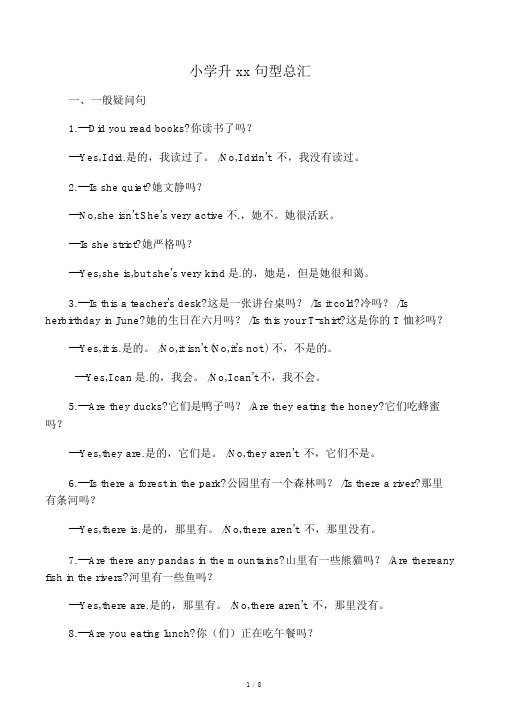
小学升 xx 句型总汇一、一般疑问句1.---Did you read books?你读书了吗?---Yes,I did.是的,我读过了。
/No,I didn't. 不,我没有读过。
2.---Is she quiet?她文静吗?---No,she isn't.She's very active不.,她不。
她很活跃。
---Is she strict?她严格吗?---Yes,she is,but she's very kind是.的,她是,但是她很和蔼。
3.---Is this a teacher's desk?这是一张讲台桌吗? /Is it cold?冷吗? /Is herbirthday in June?她的生日在六月吗? /Is this your T-shirt?这是你的 T 恤衫吗?---Yes,it is.是的。
/No,it isn't.(No,it's not.) 不,不是的。
---Yes,I can是.的,我会。
/No,I can't.不,我不会。
5.---Are they ducks?它们是鸭子吗? /Are they eating the honey?它们吃蜂蜜吗?---Yes,they are.是的,它们是。
/No,they aren't. 不,它们不是。
6.---Is there a forest in the park?公园里有一个森林吗? /Is there a river?那里有条河吗?---Yes,there is.是的,那里有。
/No,there aren't. 不,那里没有。
7.---Are there any pandas in the mountains?山里有一些熊猫吗? /Are thereany fish in the rivers?河里有一些鱼吗?---Yes,there are.是的,那里有。
初中语文作文常用句型整理
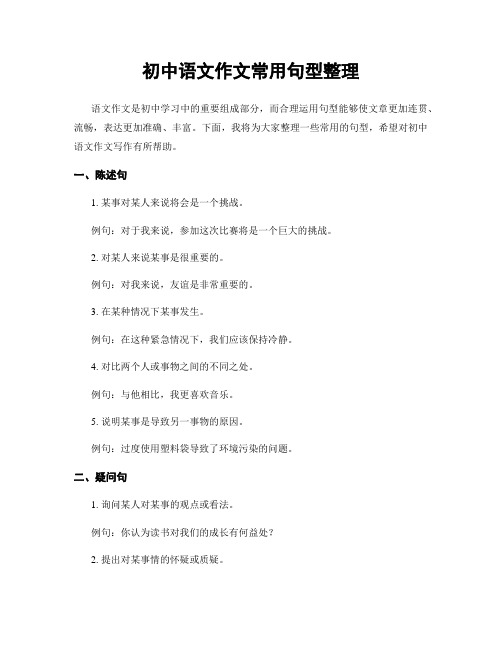
初中语文作文常用句型整理语文作文是初中学习中的重要组成部分,而合理运用句型能够使文章更加连贯、流畅,表达更加准确、丰富。
下面,我将为大家整理一些常用的句型,希望对初中语文作文写作有所帮助。
一、陈述句1. 某事对某人来说将会是一个挑战。
例句:对于我来说,参加这次比赛将是一个巨大的挑战。
2. 对某人来说某事是很重要的。
例句:对我来说,友谊是非常重要的。
3. 在某种情况下某事发生。
例句:在这种紧急情况下,我们应该保持冷静。
4. 对比两个人或事物之间的不同之处。
例句:与他相比,我更喜欢音乐。
5. 说明某事是导致另一事物的原因。
例句:过度使用塑料袋导致了环境污染的问题。
二、疑问句1. 询问某人对某事的观点或看法。
例句:你认为读书对我们的成长有何益处?2. 提出对某事情的怀疑或质疑。
例句:你相信友谊可以跨越时间和空间吗?3. 询问导致某事发生的原因。
例句:你认为环境保护应该由谁负责?三、感叹句1. 表达对某事或某人的赞美或称赞。
例句:多么美丽的花园啊!2. 表达惊讶、喜悦、遗憾等情感。
例句:真是令人惊讶的事情!四、比较句1. 对两者或多者进行比较,指出某个方面的优劣。
例句:与书本相比,网络给我们获取信息的渠道更广。
2. 强调某人或某事物的重要性。
例句:健康远比财富更重要。
五、因果句1. 指出某事物是另一事物的原因或结果。
例句:缺乏锻炼是导致肥胖的主要原因。
2. 引出一个结论。
例句:因此,我们应该采取措施保护环境。
六、条件句1. 说明某个条件下可能发生的事情。
例句:如果我们大家一起努力,我们就能取得成功。
2. 指示某个行为或结果取决于另一个行为或结果。
例句:你只有努力学习,才能取得好成绩。
七、引用句1. 引用名人或书籍中的观点或名言警句。
例句:就像马克斯·普朗克所说的:“科学不会改变世界,但科学家会。
”2. 引用事实或数据来支持论证。
例句:根据统计数据显示,越来越多的年轻人选择创业。
八、修辞句1. 使用比喻、拟人、夸张等修辞手法,使文章更加生动有趣。
高中英语高级句型归纳大全
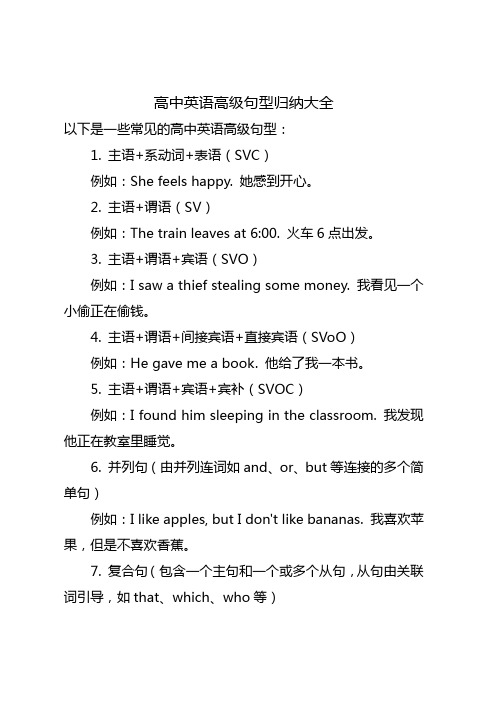
高中英语高级句型归纳大全以下是一些常见的高中英语高级句型:1. 主语+系动词+表语(SVC)例如:She feels happy. 她感到开心。
2. 主语+谓语(SV)例如:The train leaves at 6:00. 火车6点出发。
3. 主语+谓语+宾语(SVO)例如:I saw a thief stealing some money. 我看见一个小偷正在偷钱。
4. 主语+谓语+间接宾语+直接宾语(SVoO)例如:He gave me a book. 他给了我一本书。
5. 主语+谓语+宾语+宾补(SVOC)例如:I found him sleeping in the classroom. 我发现他正在教室里睡觉。
6. 并列句(由并列连词如and、or、but等连接的多个简单句)例如:I like apples, but I don't like bananas. 我喜欢苹果,但是不喜欢香蕉。
7. 复合句(包含一个主句和一个或多个从句,从句由关联词引导,如that、which、who等)例如:I like the book that he recommended to me. 我喜欢他推荐给我的那本书。
8. 祈使句(表示命令或请求的简单句)例如:Open the door! 把门打开!9. 倒装句(谓语动词的位置与正常语序不同)例如:Here comes the bus. 公交车来了。
10. 省略句(省略了某些语法成分的简单句)例如:If you can do it, so can I. 如果你能做到,我也能。
11. 虚拟语气(表示与实际情况相反的情况或假设情况)例如:If I were you, I would choose to study abroad. 如果我是你,我会选择出国留学。
12. 强调句(通过使用强调词或短语来强调某个语法成分)例如:It was she who saved the little girl. 是她救了那个小女孩。
八种基本句型例句

八种基本句型例句1、主语+谓语。
2、主语+谓语+宾语。
3、主语+谓语+间接宾语+直接宾语。
4、主语+谓语+宾语+宾语补足语。
5、主语+系动词+表语。
6、There+be+主语+。
7、比较句型。
8、it+is/was+形容词+to do/that从句。
“主语+谓语”(即“主谓”句型):这一句型英汉语言结构形式完全相同,说明“某人或某物如何动作”,或者说“某人或某物自身怎样运动”。
例:The yar rive din Harbin yesterday morning.“主语+谓语+宾语”(即"主谓宾”句型):这一句型英汉语言的'结构形式完全相同,用以说明“某人或某物做什么事情”,或者说“某人或某物发出了动作,并且其动作涉及到另一个人或物”。
例:I study English."主语+谓语+间接宾语+直接宾语”(即“主谓双宾”句型):这一句型英汉语序结构相同,说明“某人为谁(间接宾语为人)做某事”,或者说“某人或物的运动涉及到两个对象,其中一个间接对象为人,另一个为物”。
例:Our teacher taught us English.“主语+谓语+宾语+宾语补足语”(即“主谓宾补”句型):这一句型说明“某人或某物要求(使、让)某人做什么”或“某人感觉某人或物怎么样”。
例:He asked her to go there."主语+系动词+表语”(即“主系表”句型):这一句型用以说明“某人(某物、某事、某种概念)具有什么特征或处于什么状态”。
汉语的“是”字结构属于这一英语句型的形式之一。
常用的联系动词有be,keep,lie,remain,stand,become,fal,get,go,grow,turn,look,feel,seem,smell,sound,taste,例:I a mate a cher..我是一名老师。
“There+be+主语+.”(即“存在”句型):这一句型用以说明“在某地或某时存在某人或某物”。
常见的45个英语句型
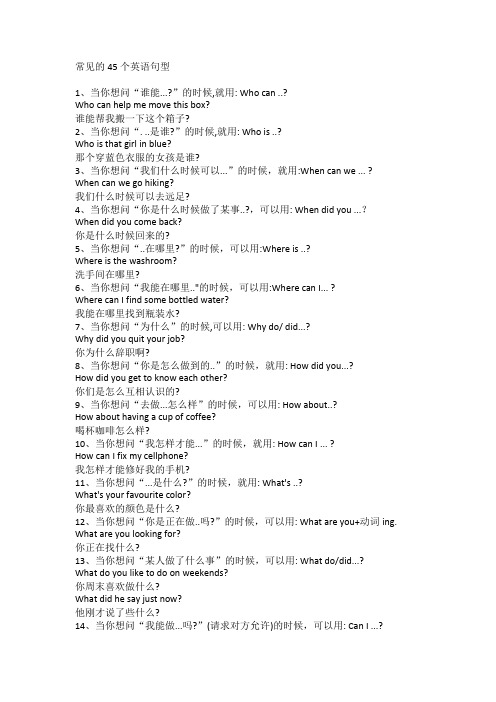
常见的45个英语句型1、当你想问“谁能...?”的时候,就用: Who can ..?Who can help me move this box?谁能帮我搬一下这个箱子?2、当你想问“. ..是谁?”的时候,就用: Who is ..?Who is that girl in blue?那个穿蓝色衣服的女孩是谁?3、当你想问“我们什么时候可以...”的时候,就用:When can we ... ? When can we go hiking?我们什么时候可以去远足?4、当你想问“你是什么时候做了某事..?,可以用: When did you ...?When did you come back?你是什么时候回来的?5、当你想问“..在哪里?”的时候,可以用:Where is ..?Where is the washroom?洗手间在哪里?6、当你想问“我能在哪里.."的时候,可以用:Where can I... ?Where can I find some bottled water?我能在哪里找到瓶装水?7、当你想问“为什么”的时候,可以用: Why do/ did...?Why did you quit your job?你为什么辞职啊?8、当你想问“你是怎么做到的..”的时候,就用: How did you...?How did you get to know each other?你们是怎么互相认识的?9、当你想问“去做...怎么样”的时候,可以用: How about..?How about having a cup of coffee?喝杯咖啡怎么样?10、当你想问“我怎样才能...”的时候,就用: How can I ... ?How can I fix my cellphone?我怎样才能修好我的手机?11、当你想问“...是什么?”的时候,就用: What's ..?What's your favourite color?你最喜欢的颜色是什么?12、当你想问“你是正在做..吗?”的时候,可以用: What are you+动词ing. What are you looking for?你正在找什么?13、当你想问“某人做了什么事”的时候,可以用: What do/did...?What do you like to do on weekends?你周末喜欢做什么?What did he say just now?他刚才说了些什么?14、当你想问“我能做...吗?”(请求对方允许)的时候,可以用: Can I ...?Can I take a look at your notebook?我能看一下你的笔记本吗?15、当你想问“你能做... 吗?”,提出请求的时候,可以用: Could you/Would you...? Could you tell me what time the store is open?你能告诉我这家店几点营业吗?16、当你想问“你是...吗?”的时候,就用: Are you...?Are you Mr. Brown?你是布朗先生吗?Are you making dinner now?你现在是在做晚饭吗?17、除此之外,问对方很多其他情况,都可以用: Doyou+动词...Do you need any help?你需要帮助吗?Do you mind if I open the window?你介意我打开窗户吗?18、当你想要问“你是否(已经)做了某件事”的时候,可以用: Have you ..? Have you seen the message I sent you?你(已经)看到我发给你的信息了吗?19、当你想问某事物的情况的时候, 可以用: Is it ..?Is it close to your house?那离你家近吗?20、当你想陈述自己的情况和观点的时候,可以用: I'm (not)+形容词/名词I'm good at dancing.我擅长跳舞。
句型常见的英语句型及其用法
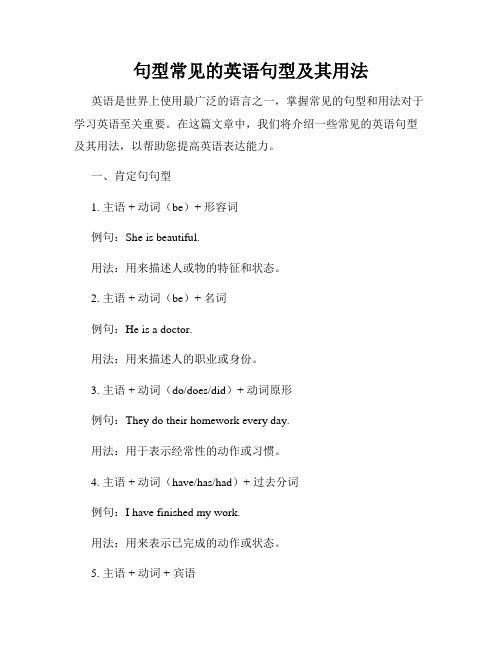
句型常见的英语句型及其用法英语是世界上使用最广泛的语言之一,掌握常见的句型和用法对于学习英语至关重要。
在这篇文章中,我们将介绍一些常见的英语句型及其用法,以帮助您提高英语表达能力。
一、肯定句句型1. 主语 + 动词(be)+ 形容词例句:She is beautiful.用法:用来描述人或物的特征和状态。
2. 主语 + 动词(be)+ 名词例句:He is a doctor.用法:用来描述人的职业或身份。
3. 主语 + 动词(do/does/did)+ 动词原形例句:They do their homework every day.用法:用于表示经常性的动作或习惯。
4. 主语 + 动词(have/has/had)+ 过去分词例句:I have finished my work.用法:用来表示已完成的动作或状态。
5. 主语 + 动词 + 宾语例句:She loves her dog.用法:用来表示动作的主体和对象。
二、否定句句型1. 主语 + 动词(be)+ not + 形容词例句:They are not happy.用法:用来表示否定的状态或特征。
2. 主语 + 动词(do/does/did)+ not + 动词原形例句:He does not like coffee.用法:用来表示否定的动作或习惯。
3. 主语 + 动词(have/has/had)+ not + 过去分词例句:We have not seen the movie.用法:用来表示否定的已完成动作或状态。
4. 主语 + do/does/did + not + 动词原形 + 宾语例句:She does not drink milk.用法:用来表示否定的动作和对象。
三、疑问句句型1. 助动词(be/do/does/did) + 主语 + 动词原形 + 其他?例句:Are you going to the party?用法:用来询问具体的情况或行动。
英语的万能句式大全
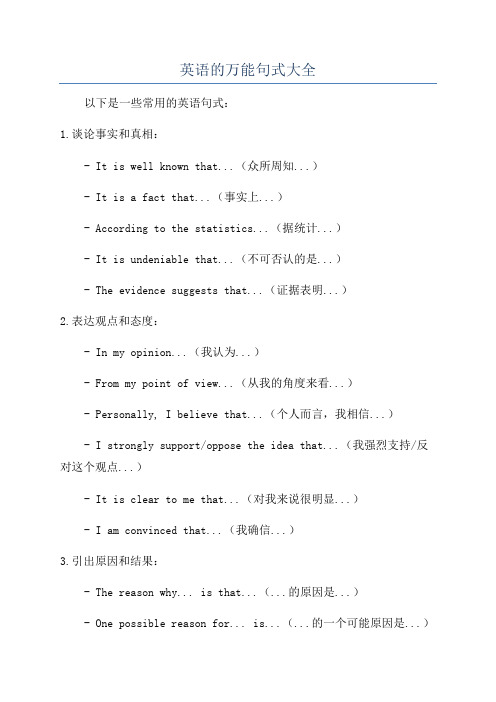
英语的万能句式大全以下是一些常用的英语句式:1.谈论事实和真相:- It is well known that...(众所周知...)- It is a fact that...(事实上...)- According to the statistics...(据统计...)- It is undeniable that...(不可否认的是...)- The evidence suggests that...(证据表明...)2.表达观点和态度:- In my opinion...(我认为...)- From my point of view...(从我的角度来看...)- Personally, I believe that...(个人而言,我相信...)- I strongly support/oppose the idea that...(我强烈支持/反对这个观点...)- It is clear to me that...(对我来说很明显...)- I am convinced that...(我确信...)3.引出原因和结果:- The reason why... is that...(...的原因是...)- One possible reason for... is...(...的一个可能原因是...)- As a result...(因此...)- Consequently...(因此...)- Therefore...(因此...)4.比较和对比:- Similarly...(同样地...)- Likewise...(同样地...)- On the other hand...(另一方面...)- In contrast...(相比之下...)- However...(然而...)5.提出建议和解决方案:- It would be advisable to...(建议...)- One possible solution is...(一个可能的解决方案是...)- It is essential to...(有必要...)- I suggest that...(我建议...)- To solve this problem, we could...(要解决这个问题,我们可以...)6.强调重要性:- It is crucial/vital/essential that...(非常重要的是...)- It is of great significance/importance that...(非常有意义的是...)- There is no doubt that...(毫无疑问的是...)- It cannot be stressed enough that...(再强调一遍...)7.提问和请求:- Could you please...?(请问你能...吗?)- Would you mind...?(你介意...吗?)- Can you tell me...?(你能告诉我...吗?)- Do you have any idea about...?(你对...有什么想法吗?)- I wonder if you could...(我想知道你能否...)8.表示同意和不同意:- I agree that...(我同意...)- I disagree that...(我不同意...)- I see your point, but...(我理解你的观点,但是...)- I can't help but disagree with...(我无法不和...不同意)- I'm afraid I have to disagree with...(恐怕我不得不和...不同意)。
高考英语经典句型 知乎

高考英语经典句型1. It is+被强调部分+that+其余部分。
2. It is+not+until+从句+that+主句。
3. What+a/an+形容词+单数可数名词+主语+谓语!4. How+形容词/副词(+主语+谓语!)。
5. either…or…。
6. neither…nor…。
7. not…but…。
8. not only…but also…。
9. both…and…。
10. whether…or。
11.Neither…nor…既不……也不……12. whether…or无论……还是……13. rather than…宁愿……而不愿……14. had better do sth 最好做某事。
15. would rather do sth than do sth宁愿做某事而不愿做某事。
16.prefer to do sth rather than do sth宁愿做某事而不愿做某事。
17. prefer doing to doing宁愿做某事而不愿做某事。
18. prefer to do sth rather than do sth宁愿做某事而不愿做某事。
19. have a good knowledge of sth对……有很好的了解。
20. have a good knowledge of English对英语有很好的了解。
21. have a passion for 对……有热情22. have a strong desire to do sth 非常渴望做某事23. be absorbed in 专心致志24. be crazy about 对……着迷25. be enthusiastic about 对……充满热情26. be fascinated by 对……着迷27. be passionate about 对……充满热情28. be enthusiastic about 对……充满热情29. can’t wait to do sth 迫不及待做某事30. decide to do sth 决定做某事。
100个最重要的英语核心句型

100个最重要的英语核心句型1. welcome to sp 欢迎到某地Eg. Welcome to China.2. What’s the matter with sb./ sth? 出什么毛病了?Eg. What’s the matter with your watch?3. be different from 与......不同Eg. The weather in Beijing is different from that of Nanjing.4. be the same as 与……相同Eg. His trousers are the same as mine.5. be friendly to sb. 对某人友好Eg. Mr. Wang is very friendly to us.6. want to do sth. 想做某事Eg. I want to go to school.7. want sb. to do sth. 想让某人做某事Eg. I want my son to go to school.8. what to do 做什么Eg. We don’t know what to do next.9. let sb. do sth. 让某人做某事Eg. Let him enter the room.10. let sb. not do sth. 让某人不做某人Eg. Let him not stand in the rain.11. why don’t you do sth?怎么不做某事呢?Eg. Why don’t you play football with us?12. why not do sth.? 怎么不做某事呢?Eg. Why not play football with us?13. make sb. sth. 为某人制造某物Eg. My father made me a kite.14. make sth for sb. 为某人制造某物Eg. My father made a kite for me.15. What …mean by …? 做……是什么意思?Eg. What do you mean by doing that?16. like doing sth. 喜欢做某事Eg. Jim likes swimming.17. like to do sth. 喜欢做某事Eg. He doesn’t like to swim now.18. feel like doing sth. 想做某事Eg. I feel like eating bananas.19. would like to do sth. 愿意做某事Eg. Would you like to go rowing with me? 20. would like sb. to do sth. 愿意某人做某事Eg. I’d like you to stay with me tonight.21. make sb. do sth. 使某人做某事Eg. His brother often makes him stay in the sun.22. let sb. do sth. 让某人做某事Eg. Let me sing a song for you.23. have sb. do sth. 使某人做某事Eg. You shouldn’t have the students work so hard.24. be far from sp 离某地远Eg. His school is far from his home.25. be near to sp 离某地近Eg. The hospital is near to the post office.26. be good at sth./doing sth. 擅长某事/做某事Eg. We are good at English.They are good at boating.27. It takes sb. some time to do sth. 某人花多少时间做某事Eg. It took me more than a year to learn to draw a beautiful horse in five minutes.28. sb. spends some time/money (in )doing sth. 某人花多少时间做某事Eg. I spent twenty years in writing the novel.29. sb. spends some time/money on sth. 某事花了某人多少时间/金钱Eg. Jim spent 1000 yuan on the bike.30. sth. costs sb. some money. 某物花了某人多少钱Eg. The bike cost Jim 1000 yuan.31. sb. pays some money for sth. 某人为某物付了多少钱Eg. Jim paid 1000 yuan for the bike.32. begin/start with sth. 开始做某事Eg. The started the meeting with a song.33. be going to do sth. 打算做某事Eg. We are going to study in Japan.34. call A B 叫A BEg. They called the village Gumtree.35. thank sb. for sth./doing sth. 感谢某人做某事Eg. Thank you for your help.Thank you for helping me.36. What ……for? 为什么Eg. What do you learn English for?37. How/ what about doing sth.?做某事怎么样?Eg. How about going fishing?38. S +be+ the+最高级+of/in短语Eg. Lucy is the tallest in her class.39. S + be +比较级+than any other + n.Eg. Lucy is taller than any other student in her class.40. have to do sth. 不得不做某事Eg. I have to go home now.41. had better do sth. 最好做某事Eg. You’d better study hard at English.42. had better not do sth. 最好别做某事Eg. You’d better not stay up.43. help sb. to do sth. 帮助某人做某事Eg. Lucy often helps Lily to wash her clothes.44. help sb. do sth. 帮助某人做某事Eg. He usually helps me learn English.45. help sb. with sth. 帮助某人做某事Eg. I sometimes help my mother with the housework.46. make it +时间把时间定在几点Eg. Let’s make it 8:30.47. take sb. to sp 带某人到某地Eg. Mr. Wang will take us to the Summer Palace next Sunday.49. have nothing to do (with sb) 与某人没有关系Eg. That has nothing to do with me.50. 主语+ don’t think + 从句认为……不……Eg. I don’t think it will rain tomorrow.51. I t’s + adj.+ for sb. to do sth. 做某事对某人来说怎么样Eg. It is lucky for you to go to London.52. How + adj/ adv + 主+ 谓!多么……啊!Eg. How beautiful the flower is!53. what + a/an + adj + n + 主+ 谓!Eg. What an beautiful flower it is!54. What + adj+ pl./[u] +主+ 谓!Eg. What bad weather it is today!55. find it + adj+ to do sth. 发现做某事如何Eg. I find it hard to speak English well!56. ask sb. for sth. 向某人要某物Eg. They often ask me for money.57. need to do sth. 需要做某事Eg. You need to study hard.58. need sth 需要某物Eg. I don’t n eed your money.59. use A to do B 用A来做BEg. We use pens to write.60. show sb. sth 给某人看某物Eg. Please show me the map.61. show sth. to sb. 把某物给某人看Eg. Please show the map to me.62. pass sb. sth. 把某物递给某人Eg. Pass me the cup of tea.63. pass sth. to sb. 把某物递给某人Eg. Pass the cup of tea to me.64. buy sb. sth. 为某人买某物Eg. Mother bought me a bike.65. buy sth. for sb. 为某人买某物Eg. Mother bought a bike for me.66. give sb. sth 把某物给某人Eg. Jim gave me an English dictionary.67. give sth. to sb. 把某物给某人Eg. Jim gave an English dictionary to me.68. get to sp 达到某地Eg. I got to Beijing on the morning of May 1st.69. arrive at /in sp 达到某地Eg. I arrived in Beijing on the morning of May 1st.70. reach sp 到达某地Eg. I reached Beijing on the morning of May 1st.71. hope to do sth. 希望某人做某事Eg. I hope to see you soon.72. there is sth. wrong with sth./sb. 某物/某人出什么状况了Eg. There is something wrong my car.73. sth. is wrong with … 某物出什么毛病了Eg. Something is wrong with my car.74. How do you like sth? 你认为……怎么样?Eg. How do you like Beijing?75.What do you think of sth.? 你认为……怎么样?Eg. What do you think of Beijing?76. start doing sth. 开始做某事Eg. I started learning English in 1983.77. start to do sth. 开始做某事Eg. I started to watch TV after finishing my homework. 78.finish doing sth. 完成作某事Eg. I finished cleaning my car just now.79. enjoy doing sth. 喜欢做某事Eg. They all enjoy living and working in China.80.What / when / where / who / something / anything /nothing else …… 别的什么/何时/何地/谁……Eg. What else do you want to buy?Where else have you gone?Who else have you played with?I have nothing else to tell you.Would you like something else?81. forget doing sth. 忘记做过某事了(已做)Eg. I forgot turning off the lights. Look, it is dark in the room.82. forget to do sth. 忘了做某事了(未做)Eg. I forgot to turn off the lights. Could you go back and shut the off?83. remember doing sth. 记得做过某事了(已做)Eg. I remembered returning your money. You are so forgetful.84. remember to do sth. 记住去做某事(未做)Eg. Remember to bring me some money. I’ve run out of it.85.stop to do sth. 停下来去做某事Eg. He stopped to talk with Mary when she enter the office.86. stop doing sth. 停止做某事Eg. The students stopped talking when the teachet came in.87. watch/see/hear sb. do sth. 观看/看见/听见某人做了某事(全过程)Eg. I saw you pick an apple just now.88. watch/see/hear sb. doing sth. 观看/看见/听见某人正在做某事(点动作)Eg. I saw you playing basketball with your classmates on the playground last Sunday.89. go on doing sth. 继续作某事Eg. He went on reading after a short rest.90. go on to do sth. 继续作某事Eg. He went on to read after finishing wash the dishes.91. go on with sth. 继续某事Eg. He went on with his work after a short rest.92. say hello/goodbye to sb. 向某人告别Eg.I came to say good-bye to you.93. be busy doing sth. 忙于做某事Eg. They are busy planting trees on the hill.94. be interested in sth. 对某事感兴趣Eg. English is very interesting. We are all interested in it.95. tell sb. to do sth. 告诉某人做某事Eg. Mother told me to go shopping with her.96. ask sb. to do sth. 让某人做某事Eg. Jim ask me to go rowing with him.97. call/ring sb. up 给某人打电话Eg. I will call you up tommow.98. be ready to do sth. 准备做某事Eg. We are ready to have lunch.99. go doing sth. 去做某事Eg. Let’s go fishing.100. prefer A/doing A to B/doing B 比起A/做A,更喜欢B/做BEg. Lucy prefers English to French.I prefer staying at home to going to the cinema.[来源]北京数学压轴题.学习者在阅读。
英语重要句型用法总结

英语重要句型用法总结1. 祈使句 (Imperative sentence)用于发出命令、请求或建议。
常以动词原形开头,如:Go away! (离开!)2. 陈述句 (Declarative sentence)用于陈述事实或观点。
其一般句型为:主语+谓语+其他成分。
如:She is a teacher.3. 疑问句 (Interrogative sentence)4. 感叹句 (Exclamatory sentence)用于表达强烈的情感或感叹。
其一般句型为:What/How + 形容词/副词 + 主语 + 谓语。
如:What a beautiful sunset! (多美的日落啊!)5. 虚拟条件句 (Conditional sentence)用于表示假设、可能条件或未实现的情况。
分为真实条件句和非真实条件句两种。
真实条件句使用现在时态,非真实条件句使用过去时态。
如:If it rains, I will stay at home. (如果下雨,我会呆在家里。
)6. 直接引语和间接引语 (Direct and indirect speech)直接引语指直接引述别人说的话,使用引号。
间接引语则是将别人所说的话转述出来。
如:Direct: She said, "I am tired." (她说:“我很累。
”) Indirect: She said that she was tired. (她说她很累。
)7. 被动语态 (Passive voice)用于强调动作的接受者,将宾语变为主语,动词使用被动形式。
如:The book was written by him. (这本书是他写的。
)8. 定语从句 (Relative clause)用于修饰名词或代词,通常由关系代词或关系副词引导。
如:The girl who is playing the piano is my sister. (正在弹钢琴的那个女孩是我妹妹。
英语中值得收藏的经典好句型(详解版)

英语中值得收藏的经典好句型(详解版)1.由while引导的状语从句它能凸显两种观点的对比,又使句子显得非常精练。
while一般用在逗号之后,如观点子类模板一My V iew on Opportunity一文的第一段:Different people have different views on opportunity. Some people think that there are few opportunities in the world, while others argue that everybody will have some kind of opportunity along his life route.这里第一句是说不同人持不同观点,第二句是两种观点的对比,均使用了宾语从句,但使用不同的动词来引导。
特殊的情况下第一段只有一句话,那么while前面就没有逗号了,如选择子类模板二Going on a Self Tour or a Package Tour一文的第一段:When it comes to traveling, some of people will choose to go on a self tour while others want to go on a package tour.当然这里叙述的是两类人不同的做法,与上述观点的对立有所不同。
2.Those who ... 句型Those是一个指示代词,指代上文出现的人们,而who引导的是定语从句,一般引出持何种观点,句子后面就可以说他们如何如何,这个句型非常精练。
如利弊子类模板一Advantages and Disadvantages of the Internet一文第二段的起始句为:Those who are in favor of the Internet claim that it has a lot of advantages.第三段的起始句为:Those who are opposed to the Internet hold that disadvantages are many.这里的对比是非常鲜明的。
经典句型100

经典句型100经典句型1001. It occurred to sb that………例句It never occurred to him that he was very popular with the old.他没有料到他很受老人们的欢迎。
I was wondering how I should do it when a good idea occurred to me.我正不知该如何做时就在这时我有了个好主意。
2. It struck sb that …………例句It suddenly struck me how we should improve the situation.我突然想出了一个办法可以让我们改进这种局面。
An awful thought has just struck me.我刚才产生了一个很坏的想法。
3. It is +adj + for sb to do sth 常用的形容词有:important, nece ssary, possible, strange, natural, convenient…….例句It is important for us students to learn how to draw a lesson from mistakes we have made.重要的是我们学生应该学会如何从我们犯的错误中吸取教训。
4. It is + adj +of sb to do sth常用的形容词有:kind, nice, careful, careless, foolish, silly, wise, stupid, rude, impolite, right, considerate, brave, clever, selfish等评价人物行为的形容词。
例句It is considerate of you to turn down the radio while I am studying.在我学习时你把收音机关小你真得很体谅人。
- 1、下载文档前请自行甄别文档内容的完整性,平台不提供额外的编辑、内容补充、找答案等附加服务。
- 2、"仅部分预览"的文档,不可在线预览部分如存在完整性等问题,可反馈申请退款(可完整预览的文档不适用该条件!)。
- 3、如文档侵犯您的权益,请联系客服反馈,我们会尽快为您处理(人工客服工作时间:9:00-18:30)。
英文经典句型(一)1. It作先行主语和先行宾语的一些句型She had said what it was necessary to say.2. 强调句型It is not who rules us that is important, but how he rules us.3. "All+抽象名词"或"抽象名词+itself"(very+形容词)He was all gentleness to her.4. 利用词汇重复表示强调A crime is a crime a crime.5. "something(much)of"和"nothing(little)of" "something of"相当于"to some extent",表示程度。
在疑问句或条件从句中,则"anything of ",可译为"有点","略微等。
""译为毫无","全无"。
"much of"译为"大有","not much of"可译为"算不上","称不上","little of"可译为"几乎无"。
something like译为"有点像,略似。
"They say that he had no university education, but he seems to be something of a scholar.6. 同格名词修饰是指of前后的两个名词都指同一个人或物,"of"以及它前面的名词构一个形容词短语,以修饰"of"后面的那个名词。
"her old sharper of a father",可译为:"她那骗子般的父亲"。
Those pigs of girls eat so much.7. as…as…can(may)beIt is as plain as plain can be.8. "It is in(with)…as in(with)"It is in life as in a journey.9. "as good as…"相等于,就像,几乎如;实际上,其实,实在。
The merchant as good as promised the orphan boy, that he would adopt him.10."many as well…as"和"might as well …as" "many as well…as"可译为"与其……,不如……,更好","以这样做……为宜","如同……,也可以……"等等。
"might as well …as"表示不可能的事,可译为"犹如……","可与……一样荒唐","与其那样不如这样的好"等等。
One may as well not know a thing at all as know it imperfectly.11."to make…of"的译法(使……成为……,把……当作)I will make a scientist of my son.12. oo…+不定式",not(ne ver)too…+不定式","too…not+不定式She is too angry to speak.13. only(not, all, but, never) too …to do so "和"too ready (apt) + to do"结构中,不定式也没有否定意义,凡是"not","all""but等字后+"too…to,"不定式都失去了否定意义,在"too ready(apt) +to do"结构中,不定式也没有否定意义。
You know but too yell to hold your tongue.14. "no more …than…"句型A home without love is no more a home than a body without a soul is a man.15. "not so much…as"和"not so much as …"结构,"not so much…as"="not so much as …",其中as有进可换用but rather,可译为:"与其说是……毋须说是……"。
而"not so much as"="without(not)even,"可译为"甚至……还没有"。
The oceans do not so much divide the world as unite it .16. "Nothing is more…than"和"Nothing is so …as"结构,"Nothing is more…than"和"Nothing is so …as"都具有最高级比较的意思,"Nothing I"可换用"no","nobody","nowhere","little","few","hardly","scarcely"等等,可译为"没有……比……更为","像……再没有了","最……"等。
Nothing is more precious than time.17. "cannot…too…"结构,"cannot…too…"意为"It is impossible to overdo…"或者,即"无论怎样……也不算过分"。
"not"可换用"hardly","scarcely"等,"too"可换用"enough","sufficient"等You cannot be too careful.18. "否定+but "结构,在否定词后面的"but",具有"which not","who not","that not",等等否定意义,构成前后的双重否定。
可译成"没有……不是"或"……都……"等Nothing is so bad but it might have been worse.19. "否定+until (till)"结构,在否定词"no","not","never","little","few","seldom"等的后边所接用的"until/till",多数情况下译为"直到……才……","要……才……",把否定译为肯定。
Nobody knows what he can do till he has tried.20. "not so…but"和"not such a …but"结构,这两个结构和"否定+but"的结构差不多,不同之点是这两个结构中的"but"是含有"that…not"意味的连续词,表示程度。
可译为"还没有……到不能做……的程度","并不是……不……","无论怎样……也不是不能……"等。
He is not so sick but he can come to school.21. "疑问词+should…but "结构,这个结构表示过去的意外的事,意为"none…but",可译为"除了……还有谁会……","岂料","想不到……竟是……"等。
Who should write it but himself?22. "who knows but (that)…"和"who could should…but"结构,这个结构是反问形式,一般意译为"多半","亦未可知"等等,有时也可直译。
Who knows but (that) he may go?23. "祈使句+and"和"祈使句+or"结构,"祈使句+and"表示"If…you…","祈使名+or"表示"if…not…,you。
Add love to a house and you have a home. Aad righteousness to a city and you have a community. Aad truth to a pile of red brick and you have a school.24. "名词+and"结构,在这个结构中,名词等于状语从句,或表示条件,或表示时间。
